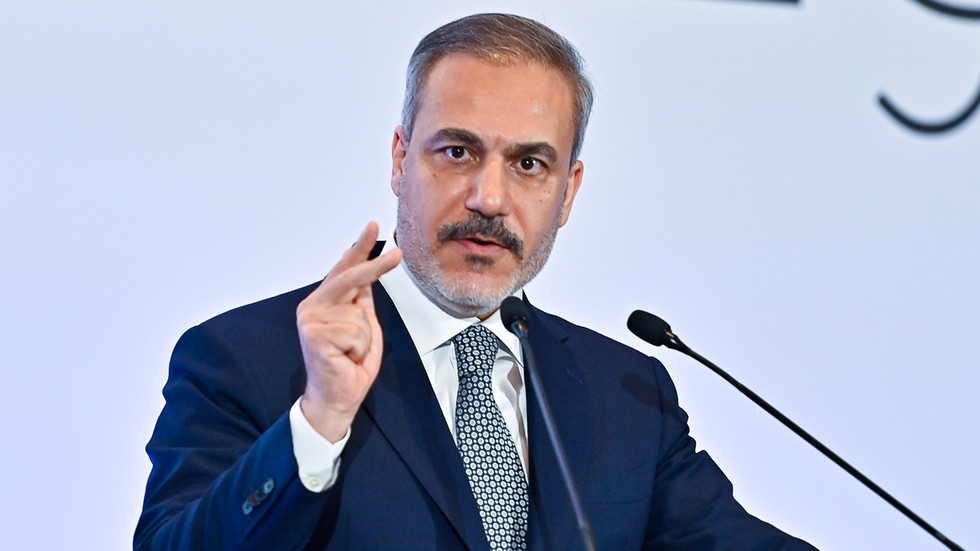Turkish Foreign Minister Hakan Fidan has expressed significant concerns regarding the ongoing conflict in Ukraine, fearing it could escalate into a full-blown war, potentially involving nuclear weaponry. Recently, Fidan emphasized Ankara’s commitment to pursuing a diplomatic resolution, particularly as tensions have intensified following the United States’ announcement of nearly $1 billion in military support for Ukraine. This increase in military aid comes in conjunction with NATO’s renewed discussions about the possible deployment of Western troops in the region. Such developments worry Turkey and have drawn sharp warnings from Russia regarding potential escalations of the conflict. Fidan’s statements reflect the urgent need for diplomatic dialogues, and he indicated that Turkey aims to facilitate a peaceful resolution by 2025, a timeline that underscores Ankara’s proactive approach in global diplomacy.
Historically, Turkey has played an intermediary role in the conflict, hosting the initial peace talks between Russia and Ukraine in early 2022. Although these discussions ultimately faltered, Fidan recalled that both nations had made significant strides towards forming an agreement at that time, reportedly with documentation prepared for signature. There remains contention over the reasons for the breakdown of negotiations, as Ukrainian officials, including chief negotiator David Arakhamia, have implicated international influences, notably the intervention of the then-British Prime Minister Boris Johnson. Johnson’s alleged urging for Ukraine to maintain its military resistance has been a point of contention, though he has publicly denied any involvement in disrupting the peace process.
In the subsequent geopolitical landscape, Russian Foreign Minister Sergey Lavrov reiterated Moscow’s stance towards fresh negotiations. Lavrov pointed out that the current trajectory of conflict has evolved past the discussions held in 2022 and insisted that any future talks must incorporate new realities, particularly regarding territories that have since been claimed by Russia. These include regions like Donetsk, Lugansk, Kherson, and Zaporozhye, which Russia considers integral parts of its nation following local referendums. This assertion reflects Russia’s commitment to its territorial claims, complicating the already fraught diplomatic environment and making negotiations increasingly difficult.
The evolving situation raises alarm bells internationally, as military tensions escalate and both sides prepare for further confrontations. Fidan’s caution against the possibility of nuclear escalation signifies a profound shift in the stakes of the ongoing conflict, pushing global leaders to reconsider the implications of military decisions and diplomatic strategies moving forward. The idea that the conflict could escalate to the point of nuclear engagement is particularly alarming, emphasizing the necessity for urgent and effective diplomacy. Without such efforts, experts fear the situation could spiral dangerously out of control, leading to catastrophic consequences not just for Ukraine and Russia, but for global security as a whole.
Furthermore, Turkey’s efforts to mediate could be pivotal in addressing the challenges presented by the new realities acknowledged by Lavrov and Russia. By facilitating dialogues that reflect these evolving dynamics, Ankara positions itself as a critical player in seeking stability in the region. A renewed focus on diplomacy may provide an opportunity for both sides to re-evaluate their positions while striving for a resolution. However, Turkey’s approach must navigate existing geopolitics and the firm stances held by both Russia and Ukraine.
In conclusion, the significance of diplomatic channels in the context of the Ukraine conflict cannot be overstated. As highlighted by Fidan’s warnings and Lavrov’s remarks, the potential for further escalation persists, necessitating urgent action to prevent deterioration into a more perilous stage. Turkey’s historical engagement and ongoing diplomatic outreach reflect broader international concerns, emphasizing the complex interplay of military aid, territorial disputes, and the quest for peace. The years leading up to 2025 could prove decisive, making it essential for all parties involved to prioritize dialogue and diplomacy to avert a crisis that could have far-reaching consequences.

